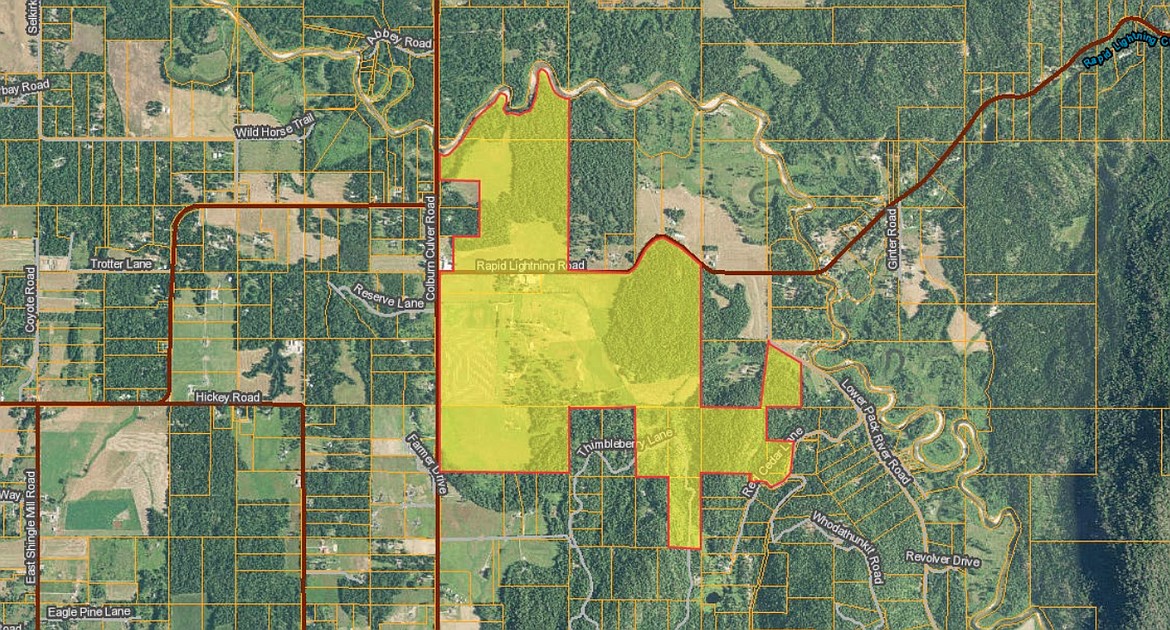Judge affirms Selle Valley rezone
SANDPOINT — A district judge has affirmed a Bonner County Commission decision to approve a 714-acre rezone request in the Selle Valley, ruling critics had not proven their claims that their due process rights were violated.
“The evidence does not support a finding that the board's interpretation and application of its zoning ordinance was arbitrary, capricious, or discriminatory,” District 1 Judge Barry McHugh wrote in the ruling issued last month. “On the contrary, the board provided additional opportunity for the submission of input on the decision. Further, the decision was based on substantial evidence in the record … [and] the court finds that the conduct of Commissioner McDonald did not deprive Petitioners of their due process rights.”
The rezone by Don and Julie Skinner and James and Diane Otis, known jointly as Pack River Partners LLC would change zoning of the 714.23-acre property from Ag-Forest 20 to Ag-Forest 10. In their application, they said the rezone would allow the owners to “have usable options for the parcels, like the surrounding area.”
However, many of those who spoke at both the original February hearing and a reconsideration a few months later in May criticized the rezone, saying such a large development would have a detrimental impact on the rural Selle Valley community.
However, at both the original hearing on Feb. 9, 2022, and a reconsideration hearing on May 4, the Bonner County Board of Commissioners voted to approve the rezone request application. The ruling prompted several nearby property owners and grassroots group Keep Bonner County Rural to seek a judicial review of the board’s decisions.
In the request, the neighbors and KBCR argued the board's decision violated county ordinance because it failed to prove a necessity and lacked information required under Bonner County Code.
While the board attempted to correct a failure to analyze impacts on public services, critics contended the decision ignore any evidence of negative impacts. In addition, KBCR and critics contended a clear bias by commissioners resulted in a prejudice against their due process rights.
However, McHugh ruled for the county and Pack River Partners, finding that the petitioners had failed to argue or show that their due process rights had not been considered. While the first three claims fell under areas the court could consider, because "they failed to raise or argue their rights were prejudiced, their first three allegations are deemed waived and will not be considered by the court,” McHugh wrote in his ruling.
However, McHugh said he could consider the petitioners’ claims that the decisions were "arbitrary and capricious" due to "a clear demonstration of bias" by a majority of commissioners.
“The Due Process Clause entitles a person to an impartial and disinterested tribunal … Decisions by a zoning board applying general rules or specific policies to specific individuals, interests or situations, are quasi-judicial in nature and subject to due process constraints,” McHugh wrote in the ruling. “When acting upon a quasi-judicial zoning matter the governing board is neither a proponent nor an opponent of the proposal at issue, but sits instead in the seal of a judge.”
Under "Republican Party of Minn. M. White," the U.S. Supreme Court noted that impartiality in the context of applying the Due Process Clause means "the lack of bias for or against either party to the proceeding. Impartiality in this sense assures equal application of the law, That is, it guarantees a party that the judge who hears his case will apply the law to him in the same way he applies it to any other party,” McHugh ruled.
Impartiality under the Due Process Clause does not guarantee each litigant a chance of changing a judge’s preconceived view of the law. Citing Eacret v. Bonner County, McHugh wrote that a “decision maker is not disqualified simply because he has taken a position even in public, on a policy issue related to the dispute, in the absence of a showing that the decision maker is ‘not capable of judging a particular controversy fairly on the basis of its own circumstances.’”
However, in considering the arguments, McHugh ruled that social media posts by McDonald did not violate the due process rights of the rezone request’s opponents.
Critics argued that the posts showed the now-former District 3 commissioner had already made up his mind before the hearing, and harbored a bias against those who would later oppose the rezone request.
“[The comments] also indicate that he was going to apply his incorrect interpretation of the law — that impacts need not be analyzed in a rezone request — to the Feb. 9, 2022, hearing,” according to court records.
However, supporters argued McDonald was “merely stating his understanding of what the law required, not the intent to violate it,” according to court records. In addition, they said the board resolved any misunderstanding of the law when it unanimously decide to hold an additional hearing to address potential impacts to other agencies.
At that second hearing, the board considered input from numerous people, groups and agencies, including Keep Bonner County Rural, Idaho Fish and Game, and the Bonner County Sheriff’s Office.
In its deliberations, the court noted that the board discussed the nature of the hearing, and the need to consider impacts on other political entities. The court noted that the commissioners felt comments were in support of the application and voted to deny the request for reconsideration.
McHugh wrote that McDonald's indicate his belief that a zone change request did not require an evaluation of potential impacts because there was no proposal to develop the property. He found that the posts also showed McDonald was committed to following the law and weighing the evidence as presented.
“These comments do not indicate his mind was made up before the hearing on the request,” McHugh wrote.



